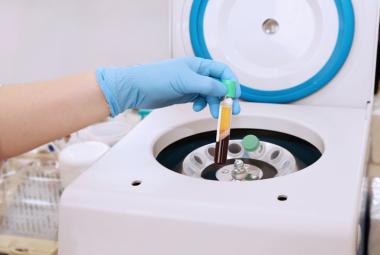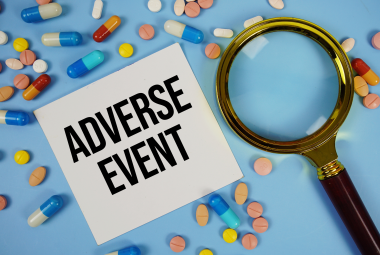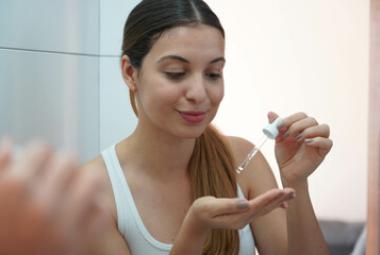Measles is an acute viral respiratory illness caused by a paramyxovirus, with humans as the only host. It is characterized by a prodrome of high fever (up to 105°F), malaise, and the "three C’s"—cough, coryza (runny nose), and conjunctivitis. A pathognomonic enanthema (Koplik spots) appears in the mouth, followed by a maculopapular (morbilliform) rash that spreads from the head downward to the trunk and extremities. Measles is highly contagious, with up to 90% of susceptible individuals developing the disease after exposure. The virus spreads through direct contact with infectious droplets and airborne transmission—it can remain suspended in the air for up to two hours after an infected person has left an area.
Infants who contract measles can experience severe complications, including pneumonia, encephalitis, and immune amnesia, which increases their susceptibility to other infections for up to three years.
Most women of childbearing age have already been vaccinated with MMR and remain protected from these diseases. For those unvaccinated or with low titer responses, the MMR vaccine, like all live-attenuated vaccines, is contraindicated during pregnancy. The earliest MMR has been studied in infants is 6 months. For mothers who were previously unvaccinated (or had a low titer response to the vaccine), this leaves a potential gap in measles, mumps, and rubella immune protection for the youngest infants. Understandably, given the measles outbreak originating in Texas--in our community--breastfeeding mothers have been asking about the safety of MMR vaccine for their infants while breastfeeding.
The MMR (measles, mumps, and rubella) vaccine is not contraindicated for breastfeeding mothers who need immunization. While breastfeeding itself does not provide direct protection against measles, maternal vaccination is a key strategy in disease prevention. Antibodies to measles, mumps, and rubella will likely be present in milk post-vaccination (see more on antibodies in milk here). There is an untested theory that vaccination during lactation would increase the amount of IgA present in the milk, which neutralizes the pathogen (measles), preventing it from systemically reaching the breastfed infant, therefore reducing the risk of infection. Researchers are currently studying MMR response in milk to see just how much protection breast milk might offer; breastfeeding mothers who plan to or have recently gotten an MMR vaccine can volunteer to provide milk for research here.
Vitamin A has been used in the treatment of measles in certain patients. However, it is a fat-soluble vitamin, meaning it can accumulate in the body and potentially cause toxicity. Vitamin A also transfers into breast milk, and large maternal doses during breastfeeding could pose risks to the infant.
There has been a rise in hospitalizations among infants and children due to vitamin A toxicity following the administration of high doses for measles prevention. For this reason, breastfeeding mothers should only take high-dose vitamin A under the guidance of a healthcare provider.
Nichole Campbell, MSN, APRN, NP-C
Todd Bell, MD
Kaytlin Krutsch, PhD, PharmD, MBA, BCPS
References:
Bonneton M, Antona D, Danis K, Aït-Belghiti F, Levy-Bruhl D. Are vaccinated measles cases protected against severe disease? Vaccine. 2020 Jun 15;38(29):4516-4519. doi: 10.1016/j.vaccine.2020.05.005. Epub 2020 May 14. PMID: 32418790.
Krow-Lucal E, Marin M, Shepersky L, Bahta L, Loehr J, Dooling K. Measles, Mumps, Rubella Vaccine (PRIORIX): Recommendations of the Advisory Committee on Immunization Practices - United States, 2022. MMWR Morb Mortal Wkly Rep. 2022 Nov 18;71(46):1465-1470. doi: 10.15585/mmwr.mm7146a1. PMID: 36395065; PMCID: PMC9707358.
National Center for Immunization and Respiratory Diseases. General recommendations on immunization --- recommendations of the Advisory Committee on Immunization Practices (ACIP). MMWR Recomm Rep. 2011 Jan 28;60(2):1-64. Erratum in: MMWR Recomm Rep. 2011 Jul 29;60:993. PMID: 21293327.
Merck Sharp & Dohme LLC. M-M-R® II (Measles, Mumps, and Rubella Virus Vaccine Live) [package insert]. U.S. Food and Drug Administration. Revised November 2024. Accessed April 4, 2025. https://www.fda.gov/media/75191/download
https://www.cdc.gov/measles/index.html
https://www.cdc.gov/vaccines/vpd/mmr/hcp/references-resources.html







